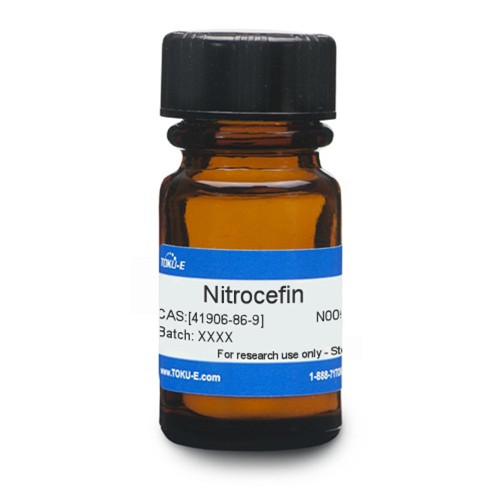Nitrocefin is a chromogenic cephalosporin used to detect β-lactamases in bacteria. Although it is a cephalosporin, it does not appear to have antimicrobial properties, but has useful diagnostic properties. Structurally, it contains a β-lactam ring which is susceptible to β-lactamase mediated hydrolysis. Once hydrolyzed, the degraded compound changes color from yellow to red. Nitrocefin can be used as a reagent in β-lactamase activity studies.
Nitrocefin is soluble in DMSO.
| Application | Nitrocefin is useful for the detection of β-lactamase patterns from bacterial cell extracts by isoelectric focusing. It can also be used in biosensor development and protein switch technology. |
| Mechanism of Action | β-lactamases hydrolyze the amide bond between the carbonyl carbon and the nitrogen in the β-lactam ring of Nitrocefin. Intact Nitrocefin is converted to hydrolyzed Nitrocefin under visible light (~ 380-500 nm) and a color change occurs from yellow (max at pH 7.0 = 390 nm) to red (max at pH 7.0 = 486 nm). |
| Microbiology Applications | Nitrocefin is used to detect β-lactamase activity from suspected β-lactam resistant bacteria (see Protocol). It is commonly used at a working concentration of 0.5 - 1.0 mg/ml. |
| Molecular Formula | C21H16N4O8S2 |
| References |
Nitrocefin (TOKU-E) was used to study: O'Callaghan CH et al (1972) Novel method for detection of beta-lactamases by using a chromogenic cephalosporin substrate. Antimicrob. Agents. Chemother. 1(4):283-288 PMID 4208895 Parr, TR et al (1984) Simple screening method for beta-lactamase-positive and-negative Ampicillin-resistant Haemophilus Influenzae isolates. J. Clin. Microbiol. 20(1):131-132 PMID 6378964 |



